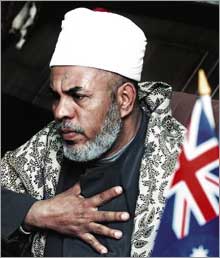Truth lost out of context

Egyptian born Taj El Din Al Hilaly, the Imam of Lakemba and the first and only Mufti leader of Australia’s 300,000 Muslims arrived in Australia from Egypt, on a three month visitor’s visa in 1982. He was sponsored into Australia by the Australian Federation of Islamic Councils and has dual citizenship: Egyptian and Australian.Most people have already heard or been insulted by the outrageous inflammatory comments of Hilali:
Hilaly is a mufti of many masks; Anti-Semite, jihad supporter and extremist, and occasional virulent critic of Australian and western society.
In the religious address on adultery to about 500 worshippers in Sydney last month, Sheik Hilali said: "If you take out uncovered meat and place it outside on the street, or in the garden or in the park, or in the backyard without a cover, and the cats come and eat it ... whose fault is it, the cats or the uncovered meat?Of course the typical excuse of self justification occurs by claiming he was being taken out of context. The trouble is when one reads or hears the whole speech then the full context is available and known which does not contradict what he said. Is this the example that the mufti wants to teach Muslims on how to treat women?
"The uncovered meat is the problem."
The sheik then said: "If she was in her room, in her home, in her hijab, no problem would have occurred."
He said women were "weapons" used by "Satan" to control men.
"It is said in the state of zina (adultery), the responsibility falls 90 per cent of the time on the woman. Why? Because she possesses the weapon of enticement (igraa)."
Waleed Ali said Sheik Hilali was "normalising immoral sexual behaviour" by comparing women to meat and men to animals and entirely blaming women for being victims.
Hilali is no stranger to controversy nor stranger to the old chestnut excuse of being taken out of context:
Foreign Minister Downer: ‘He [Hilaly] talks out of both sides of his mouth. When there was initially a suggestion in the media that he had called for a jihad, a spokesman for Hilaly said that his words had been taken out of context’.
Interviewer: ‘Well, that’s not true’.
Foreign Minister Downer: ‘Exactly. That did not turn out to be true. We got a copy of the speech, we translated the copy and it’s pretty obvious…that he’s been calling for jihads and suicide bombers to kill innocent Israeli men, women and children. He’s been praising September the 11th as Gods work’.
On 9 March [2004], on Al-Aribya, TV in Arabic he claimed:
‘Australia is a multicultural society, and is not the property of Howard or the foreign minister. I am an Australia citizen like him…. If he thinks Hezbollah is a terrorist organization, then I disagree with him’. Interviewed by the ABC, Sheikh Hilaly predictably and routinely claimed he was ‘taken out of context’ and claimed he was merely reading a poem. Like most poets, he did not support suicide bombings except ‘in the right circumstances… Against an army, not civilians’ a false distinction as Sheikh Hillay knows. Especially in the ‘context’ of suicide bombers and martyrdom operations conducted by Hezbollah, his favourite terrorist organization, against Israel and Western targets.When interviewed on ABC by Geraldine Doogue in early March 2004
He responded: "Of course, you are talking about two different environments" and added that "when addressing an Arabic community I am using the high literary Arabic language".The history of Hilali in Australia is not a pretty one.
How convenient. It's just that no other prominent Muslim in Australia appears to experience such language-induced misunderstandings.
To some, Al Hilaly's presence in Australia is an example of what is wrong with multiculturalism. Born in Egypt, he arrived in Australia on a tourist visa in 1982 from Lebanon and declined to return home. Soon he was making extremist comments which culminated in a manifestly anti-Semitic address at the University of Sydney in September 1988 where he accused Jews of trying "to control the world through sex, then sexual perversion, then the promotion of espionage, treason and economic hoarding".
Should there be a future for him?
How does he think he could justify comments and beliefs?
Is there any truth to what he claims or is it later retold out of context?
It seems he is following his usual doctrine of ex contextus.
I think a lot of Australians (even those of the Muslim persuasion) would like to tell him where he can jam his context.
Check out Dogfight for more info.









